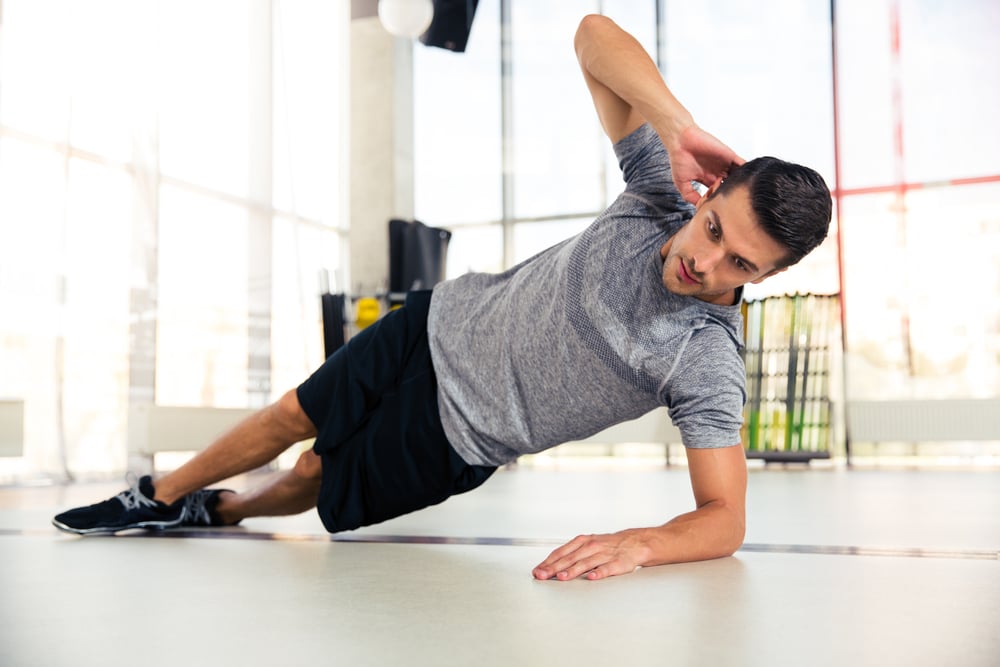
Exercise as Medicine | Physical Benefits
Body, mind, and spirit. In order for us to fully understand the human body and ourselves, we mustn’t disconnect them. They are all very important parts of one system that is the vessel in which we experience the world.
The previous editions of this series included information on exercise and how it can positively influence both the mental and emotional side of things. There is much more than that to exercise, though. And that’s why we’re here today.
A large percentage of us may see the mental and emotional benefits of exercise as an added bonus. After all, what’s the point of exercise if it isn’t going to help us function better while making us look better? Aren’t we all wanting to improve something about our bodies?
Well, it’s a good thing you’re using exercise to do so. Here are a few of my favorite ways exercise positively benefits our physical structure, performance, and appearance.
Benefit #1: Improved Resting Metabolic Rate

If you’re not in the loop on fat loss, here’s how it works on the simplest level. You need to burn more calories than you consume in the day. That is layman’s terms for the law of thermodynamics. If you are consuming more energy (calories) than you are expending during the day, you will not lose weight - I must note that it IS possible to lose body fat while eating more than you burn during the day, as long as you are sending a signal to your body to build muscle and strength. Unfortunately, calories in versus calories out can get complicated quick as there are many factors that play a role such as hormones, genetics, epigenetics, movement, nutrition, metabolic rate, and more.
According to what we currently know about the human body and the human metabolism, the amount of muscle tissue that we carry plays a large role in the amount of calories we burn at rest. The more muscle we carry, the more energy we burn automatically. You see, more muscle (even a few pounds) can speed up our metabolism. In the context of modern life, living relatively sedentary lifestyles, this is ideal.
After all, who wants to have to do vigorous exercise more and more and more just to prevent weight gain when they can strength-train and improve their automatic calorie burn?
Benefit #2: Reduced Risk of Chronic Disease
Unfortunately, chronic diseases are controlling many of our lives, and it doesn’t seem to be slowing down. We can thank processed foods and sedentary lifestyles for this.
Exercising regularly has been shown to reduce the risk of chronic disease. I would like to specifically point out insulin sensitivity. Type II diabetes seems to be taking more and more people by the minute. If you’re not quite familiar, type II diabetes comes about when one gets to a point of health where their body stops responding to insulin, and blood glucose isn’t able to be shuttled to cells. There is certainly a genetic component related to type II diabetes, but it is quite apparent that a large majority of type II diabetics are overweight. This makes sense, as excess fat makes it harder and harder for cells to respond to insulin.
If you have a type II diabetes in your family, it may be time to start exercising regularly. After all, your health is like an investment account with compound interest. The work you put in now will pay off ten-fold down the road.
Benefit #3: Exercise Promotes Better Sleep
Before I continue, it must be noted that those with chronically elevated cortisol due to excess stress may not see  the direct benefits here. No matter where you’re at, managing stress is a must when it comes to your short and long-term health.
the direct benefits here. No matter where you’re at, managing stress is a must when it comes to your short and long-term health.
Anyway, regular exercise has also been shown to promote better sleep quality. The human body regulates a constant flow of ups and downs in many of its systems. This seems to be true with sleep as well.
Research shows that regular exercise depletes energy levels, setting up an opportunity for the parasympathetic nervous system (which is in charge of rest and digest) to do its job at an optimal level.
It is important to note that exercising too hard too often is a sure way to wreck your sleep. You’ll know you’re overtraining when it gets harder and harder for you to sleep. Point is, have balance. Train hard, and rest hard. Eliminate stress as often as you can. Your body knows what to do.
ABOUT THE AUTHOR
 Adam is a fitness professional, baseball fan, and cookie fanatic based in Fort Collins, Colorado. After hanging up the cleats, he found a strong interest in the human body and how it performs. Since then, Adam has been transforming lives through fitness in a fun and encouraging atmosphere. As an ACE CPT and Fitness Nutrition Specialist, he is constantly moved to help people improve in all walks of life.
Adam is a fitness professional, baseball fan, and cookie fanatic based in Fort Collins, Colorado. After hanging up the cleats, he found a strong interest in the human body and how it performs. Since then, Adam has been transforming lives through fitness in a fun and encouraging atmosphere. As an ACE CPT and Fitness Nutrition Specialist, he is constantly moved to help people improve in all walks of life.Subscribe Here!
Topics
- Accessible Fitness Machines (1)
- American Diabetes Association (1)
- American Heart Month (2)
- Awareness (3)
- Benefits of Kale (1)
- Best Fitness Websites (1)
- Breast Cancer (1)
- Breast Cancer Awareness (4)
- Buyer Beware (1)
- Cancer (1)
- Cancer Awareness (4)
- Carbohydrates (1)
- Cardio Aid (2)
- Cardio Equipment (7)
- Celebrity Fitness (1)
- Childhood Obesity (2)
- Christmas List (1)
- Commercial Fitness (12)
- Community (1)
- Corporate Wellness (5)
- Cortisol (1)
- Crossfit (2)
- Crosstrainer (1)
- Deals and Discounts (10)
- Diabetes Awareness (1)
- Diamondback Ellipticals (1)
- Diet (1)
- Diet and Nutrition (31)
- Diet Myths (1)
- Dietary Lifestyle Options (1)
- Eating Clean (1)
- EFX (1)
- Elliptical (14)
- Ellipticals (6)
- ElliptiGo (2)
- Energy (1)
- Exercise (6)
- Exercise Accessories (1)
- Exercise and Diabetes (1)
- Exercise at Work (1)
- Exercise Bike (6)
- Exercise Equipment (26)
- Exercise Equipment Demos (11)
- Exercise Machine (5)
- Exercise Prevents Cancer (1)
- Exercising at Night (1)
- Expresso Bike (2)
- Expresso Stationary Bike (2)
- Fat Loss (7)
- Fitness (23)
- Fitness Accessories (2)
- Fitness and Exercise (99)
- Fitness at Work (1)
- Fitness Blogs (6)
- Fitness Books (1)
- Fitness Education (75)
- Fitness for Special Needs (1)
- Fitness Gifts (1)
- Fitness Journey (5)
- Fitness Machine (11)
- Fitness Machines (4)
- Fitness Motivation (13)
- Fitness on the Go (1)
- Fitness Room (2)
- Fitness Stocking Stuffers (1)
- Fitness Technology (1)
- Fitness Tips (2)
- Fitness Tracker (1)
- Fitness Videos (1)
- Fitness Wearables (1)
- Flexibility (2)
- Food Myths (3)
- Fun and Educational Videos (9)
- Functional Training (3)
- Getting Back in Shape (1)
- GFX (1)
- Gift Ideas (1)
- Gluten Free (1)
- Goals (1)
- Gym Safety (1)
- Health (6)
- Health and Fitness (96)
- Health Myths (1)
- Healthy Eating (2)
- Healthy Food (6)
- Healthy Lifestyle (3)
- Healthy Recipes (4)
- Heart Disease (1)
- Heart Health (11)
- HIIT (7)
- HIIT at Home (7)
- Hip Hop (1)
- Holiday Eating (1)
- Holiday Fitness (1)
- Holiday Meals (1)
- Holiday Parties (1)
- Holidays (1)
- Home Fitness (77)
- Home Fitness Equipment (43)
- Home Fitness Machine (2)
- Home Gym (19)
- Home Gym Design (4)
- Hospitality Fitness (1)
- How to Get More Energy (1)
- Hydration (1)
- IFT (1)
- Injury Prevention (1)
- Insider (1)
- Inspiration (1)
- Inspire Ellipticals (1)
- Kale (1)
- Kids Fitness (2)
- Let's Move! (1)
- Low Cholesterol (1)
- Meal Planning (3)
- Men's Fitness (2)
- Metabolism Booster (1)
- Michelle Obama (1)
- Mobility (3)
- Motivation (1)
- Motivation to workout (4)
- Movember (1)
- New Product News (24)
- New Products (1)
- Nu-Step (1)
- Nustep (1)
- Nutrition (2)
- Nutrition Myths (2)
- Office Exercise (1)
- P3 News (7)
- P3 Retail Store News (12)
- Paleo (1)
- Partnership for a Healthier America (1)
- Personal Training (1)
- Postpartum Exercise Routine (1)
- Precor (17)
- Precor Ellipticals (6)
- Precor Treadmills (4)
- Push Pedal Pull (28)
- Recovery (1)
- Recumbent Bike (4)
- Recumbent Cross Trainers (1)
- Resistance Training (2)
- Resolutions (1)
- Rowing Machine (7)
- senior fitness (1)
- silver sneakers (1)
- Site Blog (33)
- Stay Active During Holidays (1)
- Strength Training (11)
- Stress (1)
- Stress Weight (1)
- Stretching (2)
- Strong is the New Skinny (1)
- Successful Resolutions (1)
- Trade in Elliptical (1)
- Trade in Fitness Equipment (1)
- Trade in Treadmill (1)
- Treadmill (13)
- Treadmills (7)
- True Treadmills (1)
- Used Elliptical (1)
- Used Equipment (3)
- Used Exercise Machines (1)
- Used Fitness Equipment (1)
- Used Treadmill (1)
- Valentine Workout (1)
- Valentine's Day (1)
- Vegan (1)
- Vibration Training (5)
- Warming Up (1)
- Weight loss (17)
- Weight Loss Booster (1)
- Weight Training (3)
- Women's Fitness (4)
- Working Out (5)
- Workout Inspiration (2)
- Workout Partner (2)
- Workouts (5)
